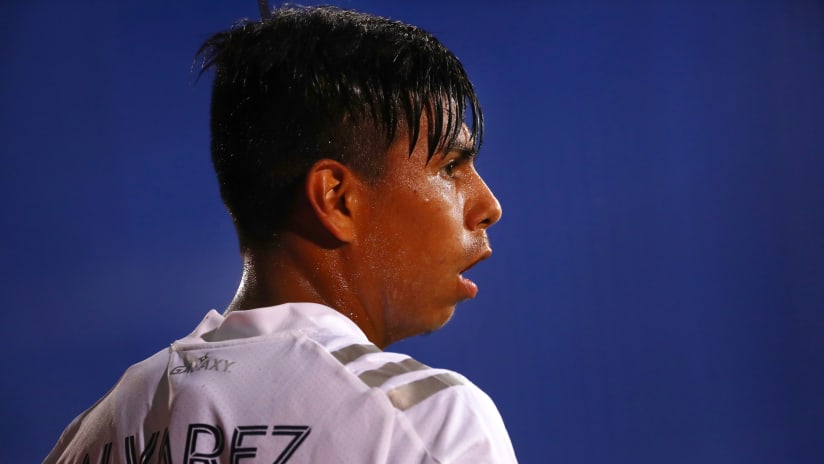To borrow a concept from 1980s cinema, the US men’s national team technical staff had a “Say Anything” moment this week.
Maybe including Efrain Alvarez on their 48-player preliminary roster for next month’s Concacaf Olympic qualifying tournament wasn’t quite as bold or moving as John Cusack hoisting that boombox over his head outside his high-school sweetheart’s house. But it’s not all that often that a national team underlines their appreciation for a young player by including them in such a list all while they’re already on the list of the rival country next door.
That’s music to the ears of Herculez Gomez.
“With Jonathan Gonzalez and past players this had happened to, it was like, ‘Well, yeah, but what happened? They weren't very good.’ That always seems to be the mindset, or the excuse,” the ESPN pundit and retired USMNT striker told MLSsoccer.com on Wednesday.
“For the first time in its history, you've had something like this happen, you have two national teams who are openly fighting for [Alvarez]. You have Gregg Berhalter, who has mentioned him more than once, who invited him to camp for the December camp [and] El Salvador game. You have a Mexican national team that is openly recruiting players in your own country, who are very keen on retaining said player and future players like him. So this is a game-changer.”
A Mexican-American who played club soccer on both sides of the border but proudly represented the country of his birth at the international level, Gomez is one of the most vocal critics of U.S. Soccer’s approach to Latinos in recent years.
But he sees reasons for optimism as Berhalter and US Olympic coach Jason Kreis work to make their program attractive to players like Alvarez and Gonzalez, the California native and CF Monterrey midfielder who sparked recriminations when he switched allegiances to El Tri in 2018. It's all occurring even if “Efra” remains somewhat unproven at the first-team level, with one goal and five assists in 1,236 MLS minutes over the past two seasons.
“Whatever he does, he's going to let somebody down,” Gomez said of Alvarez. “That's the reality of things, I'm sure within his own household there are contrasting views. So it's a difficult choice. That was my immediate reaction.
“Now, where can he most likely play? That gets a little murkier,” he added. “You look at the amount of players in the US men's national team or youth national team pools that are that are emigrating abroad, it's going to be a little bit tougher for him to maybe get in some of those camps, maybe get noticed more over players who are playing in Europe. And maybe that's not the same on the Mexico side. Why? Because Mexico quite frankly isn’t exporting as many U-23 players as the States is at this moment.”
Alvarez also faces questions about his best positional fit at the international level and his ability to match the physical and defensive demands of the systems preferred by Berhalter and Mexico coach Tata Martino. Former Galaxy coach Guillermo Barros Schelotto was quite measured with Alvarez's playing time for similar reasons. But the Los Angeles native possesses rare levels of final-third creativity and Gomez finds the effusive praise of Efra’s former teammate Zlatan Ibrahimovic still ringing in his ears.
“[Schelotto] was open about it, he needs to be a harder worker, he needs to take more responsibility. Tactically he needs to be more of a team player, all these different things,” said Gomez. “But I go back to Zlatan Ibrahimovic … they asked him about Efra and he blatantly says he's the only one with the soccer brain. He's the only one who understands how to play.
“He's talking about a kid who's 16 years old [at the time]. So it's got to blow your mind – if Zlatan, one of the greatest footballing talents of certainly my generation, and maybe in the world's history of the game, has this kind of thought about a player who's 16 years old, you've got to be asking yourself: What can you do to explode this talent? What can you do to make sure he's on the right track to progress?”
Herc warns that “there are going to be thousands more like Efra,” as both sides scramble to unearth and polish other dual-national gems among the Mexican-American diaspora. It’s the latest installment in a long-running competition, albeit one that may be charged with extra meaning as US-reared prospects become dramatically more attractive, and valuable, to big clubs across Europe.
In 2019, the FMF (Mexican federation) hired USMNT icon and former US youth national team coach Hugo Perez to scout for El Tri-eligible talent in the United States. Gomez said they’ve reached out to him, too.
“I have received phone calls from FMF asking me what they can do to openly recruit and help their cause within the States. I've been contacted by the Mexican federation before the US federation, which blows my mind,” he said.
“I think finally both [national teams] are recognizing the importance of a certain type of player.”














